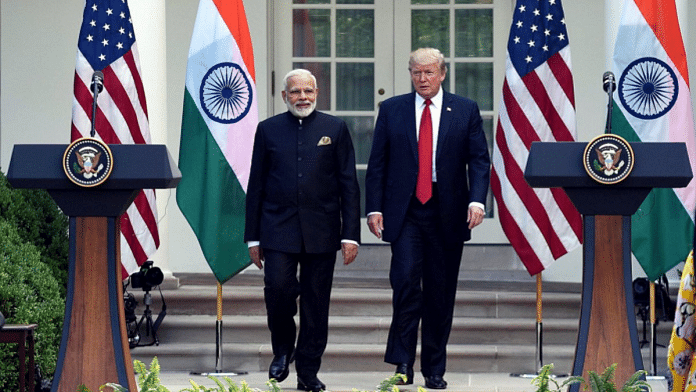US President Donald Trump’s upcoming visit to India demonstrates that the improbable US-India strategic partnership is getting stronger. But there is a lot going against this partnership: Trump has a long-standing distrust of alliances, and he clubs India along with those taking trade advantage of the US. He does not appear to like foreign travel very much either. On the other side of the equation, India has a continuing aversion to anything smacking of being locked in an alliance, which somehow seems to affect partnering with the US more than others.
India is also going through its own self-inflicted economic and diplomatic troubles. The Modi government has been none too pleased with the response to these troubles from American foreign policy elites.
If the US and India are overcoming the challenges, China deserves credit entirely because it is the security pressure from China that is bringing this change about. China’s behaviour has been strategically inept, even if it is tactically adroit. There was, until recently, little appetite in the US for challenging China. But China’s constant pressure is changing the US’ domestic debate. China’s behaviour towards its neighbours has been even more imprudent. Most of its neighbours benefit enormously from trade with China, and they would like little more than to continue to grow with China. But China’s behaviour is forcing their hands.
India is no different. There is little doubt that India would prefer a different path than being forced to pick sides between the US and China. But even an India that sees alignment as a threat to its strategic autonomy is being forced to pick a strategic alignment with the US because Beijing is leaving it little choice.
Also read: Trump visiting India when Chinese economy is down. Modi govt must seize trade opportunities
India, US and their China headache
Still, India and the US do face challenges that need to be addressed. And these challenges are much more fundamental and can’t be fixed with a trade deal or by the purchase of more American weapons, though these are also necessary and important. A critical one is that India and the US face different challenges from China, which makes uniting against it a complicated endeavour.
The challenge that the US faces from China is not of a direct military threat to its territory, but that of China seeking to force the US out of the Indo-Pacific region, or at least away from China’s southern flank. This involves China asserting its military power in the region to deter the US, and an undermining of the US hub-and-spoke alliance structure. This is, relatively speaking, less serious than the threat that China poses to India and other neighbours. It is not entirely inconceivable that the US could consider this as an acceptable price to pay if the alternative is a war with China, especially considering that American weariness with global commitments is not confined to Trump. Concerns about China are growing in the US, but the reluctance to continue bearing global burdens is also strong. Such sentiments are likely to grow if Asian powers such as India are seen to be ‘buckpassing’, shifting the burden of dealing with China on to American shoulders.
The challenge for India is different. China is, of course, a direct military threat. But India will not expect the US to fight alongside to defend India because New Delhi realises that such commitments will require reciprocity. The US can help India to defend itself better, but this requires a greater willingness on India’s part to help itself and be helped. Low defence budgets, especially for modernisation, do not help; neither does foolishly increasing Indian dependence on Russia, especially when there is bipartisan US anger at Russian foreign behaviour. This is one of the few areas on which Republican and Democrats agree, and on which Republicans are actually willing to disagree with Trump.
Also read: ‘Won’t feel good about size of crowd in US now’ — Trump ahead of his India visit
Beijing’s growing clout
China’s challenge to India is much more than just the military. China also presents a political challenge because of its growing influence in international forums. Arguably the greater, almost everyday challenge is dealing with China’s influence in international organisations and negotiations. There is little doubt that China’s power in such settings will continue to grow. And China has not been shy about using its economic power to get its way. If you doubt its effectiveness, just look at how effectively they have shut out Taiwan.
This is where Washington has been and can continue to be beneficial to India. Others, such as France, can help too, though Russia is likely to become increasingly shaky. But the US still needs to provide the lead; without the US on point, others are likely to back down. The US is thus irreplaceable in this role.
Also read: US stops treating India, China as developing countries for trade benefits
Containing China
Indeed, going forward, a diplomatic containment of China should take priority, in which the US and India cooperate to counter China’s diplomatic offensives against smaller countries when China accuses them of imaginary slights. The ‘free and open Indo-Pacific’ formulation is a useful start, but it needs to be bolstered by other such diplomatic initiatives.
Common security concerns and stronger ties do not mean a trouble-free relationship. Politics within such partnerships is always intense, because there are variations in how dangers are perceived and prioritised, and burdens shared. Most importantly, both sides need to recognise and understand that the challenge that China poses to each is different.
The author is a professor in International Politics at Jawaharlal Nehru University, New Delhi. Views are personal.




India and US relationship is not strained. It’s on equal footing. Modi haters can say whatever they want as non in Modi government listen to their BAKAWAS printed by leftist media.